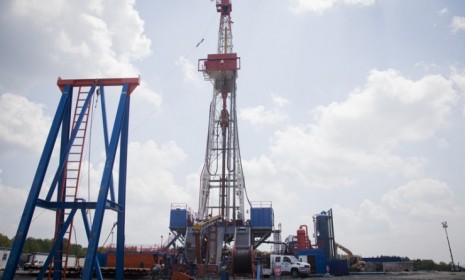Can fracking cause earthquakes?
A sharp increase in Oklahoma's seismic activity has many wondering if underground drilling is responsible

A free daily email with the biggest news stories of the day – and the best features from TheWeek.com
You are now subscribed
Your newsletter sign-up was successful
On Nov. 5, a 5.6-magnitude tremor rattled Oklahoma — one of the strongest to ever hit the state. Oklahoma is typically seismically stable with about 50 small quakes a year. But in 2009, that number jumped up to more than 1,000. Some people say the increasingly common use of hydraulic fracturing, or fracking — the controversial practice of blasting underground rock formations with high-pressure water, sand, and chemicals to extract natural gas — may have put stress on fault lines. Can human activity really cause the earth to move? Here, a brief guide:
So humans can cause earthquakes?
It has happened before. One "textbook case" occurred in 1967 in India, says Peter Fairley at IEEE Spectrum, when the reservoir behind the hydroelectric Koyna Dam was filled up. The added water "unleashed a magnitude 6.3 quake" by placing stress "on a previously unknown fault, killing 180 people and leaving thousands homeless."
The Week
Escape your echo chamber. Get the facts behind the news, plus analysis from multiple perspectives.

Sign up for The Week's Free Newsletters
From our morning news briefing to a weekly Good News Newsletter, get the best of The Week delivered directly to your inbox.
From our morning news briefing to a weekly Good News Newsletter, get the best of The Week delivered directly to your inbox.
Why do people think fracking is to blame in this case?
While it's not hard to imagine that injecting liquids underground at high pressure might somehow be related to seismic activity, there is actually "some evidence that fracking may induce minor tremors," says Bryan Walsh at TIME. In January, a flurry of about 50 "very small" quakes with magnitudes between 1.0 and 2.8 may have been the direct result of fracking, he says, citing a report from the Oklahoma State Geological Survey.
But wasn't the Oklahoma quake much stronger?
It was. A few experts say that the process of fracking for gas might not "pack nearly the punch of even a moderate earthquake," says Jonathan Fahey at the Associated Press. "The magnitude-5.6 quake that rocked Oklahoma had the power of 3,8000 tons of TNT," enough to damage buildings. The typical quake caused by fracking, in contrast, would merely cause dishes to rattle on the kitchen counter.
A free daily email with the biggest news stories of the day – and the best features from TheWeek.com
So it wasn't the cause, then?
The biggest Oklahoma quake was so strong it was almost certainly natural. But fracking isn't completely "off the hook," says Walsh. Even though "a typical gas frack is tiny compared with the power of even a minor quake," there's evidence suggesting that in areas like Arkansas and Texas — "where far greater amounts of drilling wastewater" are used to search for underground oil reserves — fracking "may put more stress on faults," making potential earthquakes even stronger. So now scientists are busy trying to figure just how big a quake human activity can cause.
Sources: AP, IEEE Spectrum, TIME
-
 Why is the Trump administration talking about ‘Western civilization’?
Why is the Trump administration talking about ‘Western civilization’?Talking Points Rubio says Europe, US bonded by religion and ancestry
-
 Quentin Deranque: a student’s death energizes the French far right
Quentin Deranque: a student’s death energizes the French far rightIN THE SPOTLIGHT Reactions to the violent killing of an ultraconservative activist offer a glimpse at the culture wars roiling France ahead of next year’s elections
-
 Secured vs. unsecured loans: how do they differ and which is better?
Secured vs. unsecured loans: how do they differ and which is better?the explainer They are distinguished by the level of risk and the inclusion of collateral